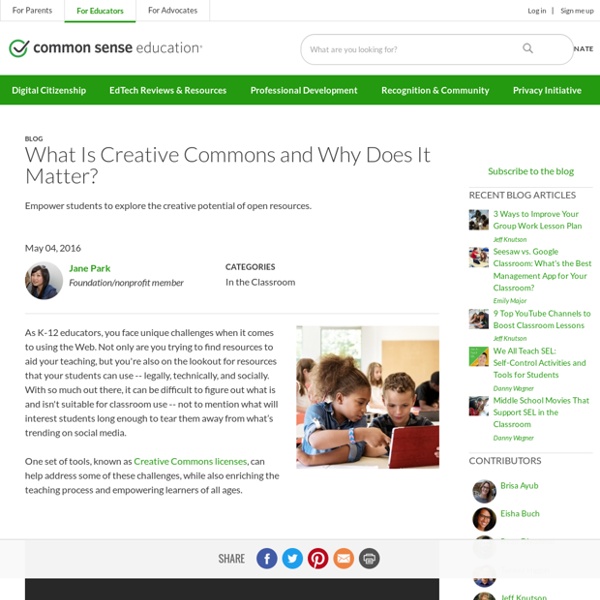About
A collaborative project that has being brought to life just a few days before #openeducationwk in 2017 to curate open stories by educators, researchers, students and other learners and connect individuals and ideas from around the world during #openeducatiowk and the #yearofopen 2017. The team consists of individuals from 6 continents. We are all PhD students and members of the GO-GN. We are looking for stories from educators, researchers, students and other learners from around the world about how they discovered openness and what it means to them.
14 copyright essentials teachers and students must know
Using copyrighted material incorrectly can land teachers and students in hot water. Here’s what you need to know to stay safe. (Image by Gerd Altmann via Pixabay.com / CC0)
What Is Creative Commons, And Should You Use It?
Advertisement While writing out your next academic paper, you look online for various images which are appropriate for what you’re talking about. Once you find something you like, you simply copy and paste it because, hey, who’s stopping you? More than likely, doing this is technically illegal. Not only that, but it applies to most content that you can find online — including posts/articles and videos. To make things easier on both content creators and consumers, Lawrence Lessig created the suite of Creative Commons licenses, a set of copyright licenses which clarify what you can do with content licensed with one of those licenses.
Creative Commons in K-12 Education: Using and Sharing ...
My friend and colleague Karen Richardson is the perfect person to give novices a quick primer on Creative Commons. Let me share Richardson's thoughts in this special guest posting. More and more teachers and students are creating multimedia projects. Often, these materials include copyright-protected items such as images, audio files, and video clips. Distributing them without the owner's permission on the Web is against the law, even for teachers and students.
Education / OER Resources
1. General Search 1.1 Google Many people start out looking for OER using Google.
New ISTE Standards for Educators Highlight Librarians’ Role
Educators should continually participate in professional learning, advocate for equitable access to technology, and model positive and ethical use of technology, according to the Empowered Professional qualities named in the International Society for Technology in Education’s (ISTE) newly revised and updated Standards for Educators. ISTE CEO Richard Culatta introduced the standards during the opening keynote session at the ISTE 2017 conference in San Antonio in June. Organized into the two categories—Empowered Professional and Learning Catalyst—the newly updated standards shift from the previous Standards for Teachers, which emphasized supporting student learning with technology, to focusing on the roles of educators in “using technology to empower learners.” As Learning Catalysts, educators should be collaborators, designers, facilitators, and analysts, according to the standards. In these roles, they are expected to collaborate with other educators as well as students.
Copyright for teachers
Copyright: Definition According to the U.S. Copyright Office, copyright is "a form of protection grounded in the U.S.
About The Licenses
Our public copyright licenses incorporate a unique and innovative “three-layer” design. Each license begins as a traditional legal tool, in the kind of language and text formats that most lawyers know and love. We call this the Legal Code layer of each license. But since most creators, educators, and scientists are not in fact lawyers, we also make the licenses available in a format that normal people can read — the Commons Deed (also known as the “human readable” version of the license).
Images - Finding Public Domain & Creative Commons Media
When you are adding images, videos and other content that you did not create to your presentation, it is important to make sure that you are not violating anyone's copyright. One way to do so is to find public domain images for your presentations. Copyright.gov explains the public domain as follows: "A work of authorship is in the “public domain” if it is no longer under copyright protection or if it failed to meet the requirements for copyright protection. Works in the public domain may be used freely without the permission of the former copyright owner."
Ashoka Changemaker Schools - Start Empathy
Close Golestan Kids Private | Berkeley, CA Golestan Kids is a private, Persian language immersion pre-k school with 80 students, class sizes of 7-10, each with 2 teachers, located in Berkeley, CA. They support the development of curious, innovative, and compassionate children through experiential and reflective learning, with a focus on heritage language immersion and cultural education. About 80% of their teaching materials are Montessori based.
The Educator’s Guide to Copyright, Fair Use, and Creative Commons – The Edublogger
The Edublogs support team regularly receives complaints and official requests to remove copyrighted content that users have placed on blogs. The legal jargon with respect to digital copyrights can be confusing – especially since different countries have their own laws and regulations. Understanding digital copyright is an essential skill we need to understand and teach our students. With this post, we hope to dispel a few myths and pull together a complete list of resources for teachers and students to use when blogging and working with content online. This post was originally written by Ronnie Burt, on the Edublogger, on Feb, 2012. It’s been re-written with content and comments from the original post combined with updated content by Sue Waters.
Personal Reputation Management - Critical to Your Success in the Digital World!
There has never been a better time when you could build and create your personal reputation with ease. There are hundreds of avenues you can exploit to enhance your personal reputation online. You can come up with your own blog, create content through various social media channels, publish articles on various press release distribution websites and engage in fruitful discussion in your area of expertise.



